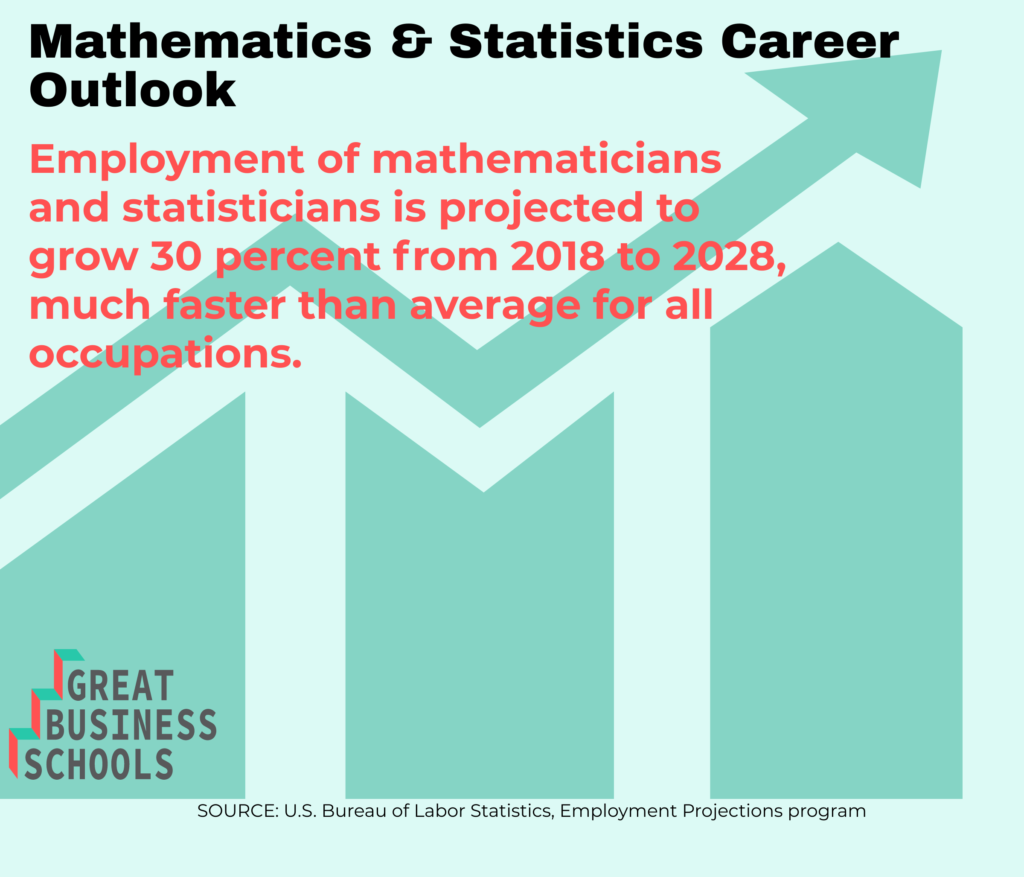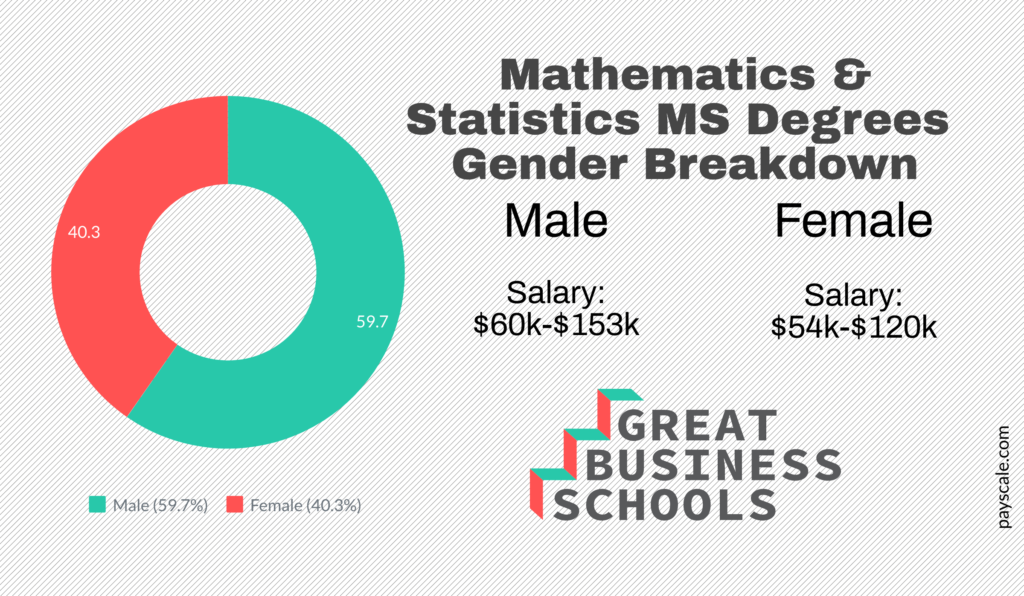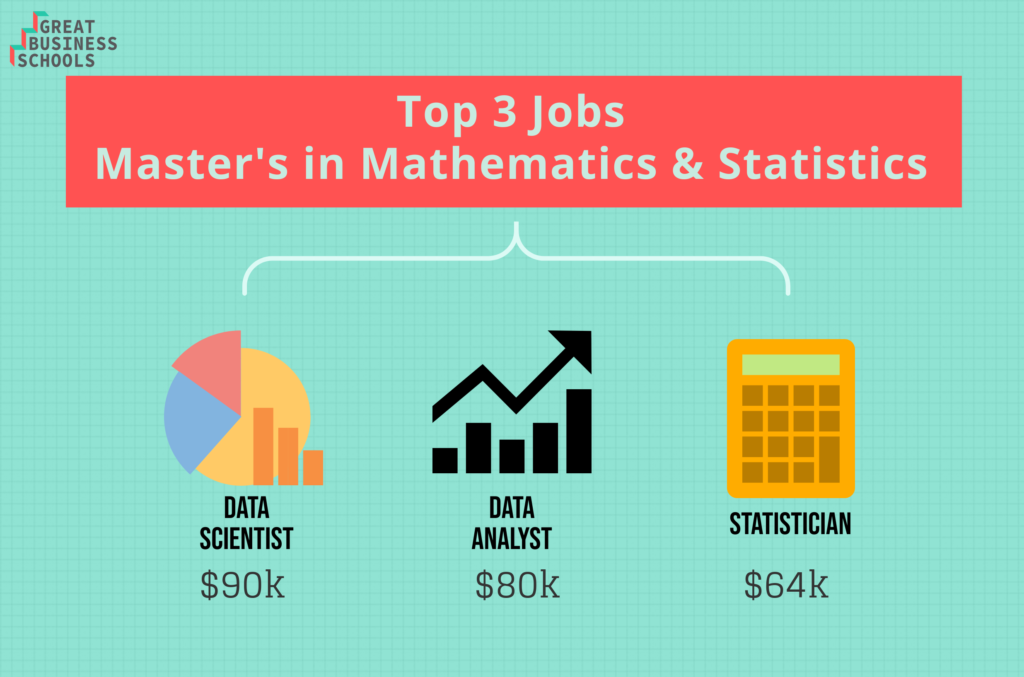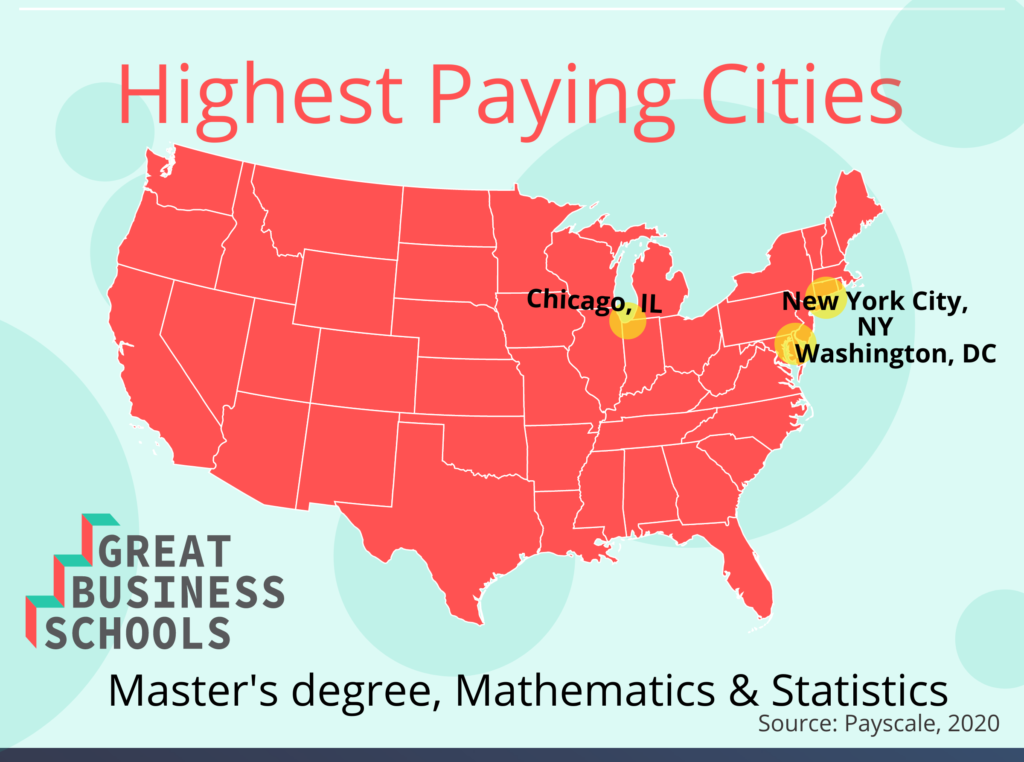What can I do with a master’s in mathematics? A master’s in mathematics is a popular major because of the range of career opportunities that are possible. A master’s in mathematics can prepare a person for teaching mathematics at a Junior College or Community College. For those who have a passion for numbers and/or the person just wants to puzzle out a solution in a field of study, there are myriads of fun-and-entertaining paths to employment that are more easily made possible with a master’s in mathematics and statistics. For those individuals wondering “What can I do with a master’s degree in mathematics?”, the answer is simple. Just imagine a field of study that inspires a passion or interest. It’s likely there’s some tie-in with mathematics or statistics. It might just take a bit of imagination and hard work.
What to do with a master’s degree in mathematics?
A graduate degree in mathematics and statistics can be the basis of some of the best careers ranging from the tech industry to banking and finance to education and scientific research. Nothing, truly nothing, happens without mathematics and statistics in the modern world. Wondering what to do with a master’s degree in mathematics? Is a master’s in mathematics worth it?

The fact of the matter is, the job market is more competitive than ever, and expertise, experience, and impressive credentials are at a premium. A master’s in math or statistics doesn’t just give you more specialized knowledge in your area – it sets you apart from applicants on the job market who only have a bachelor’s, and signals to employers that you are a serious candidate with serious brains, dedication, and reliability. After all, getting a master’s in math and statistics is hard work.
According to some estimates, 35% of those who graduate with a master’s degree in mathematics go on to pursue studies in business, graduate school, and medical school. The master’s in mathematics careers include a range of jobs that include that of an economist, tax examiner or collector, mathematicians, astronomer, financial planner, accountant, financial analyst, insurance underwriter, and teacher. Careers with a master’s in mathematics delve into fields of data science, information technology, and actuarial science.
If it sounds too technical, look again. Careers with a master’s in mathematics allow students and professionals to develop skills and knowledge that supports growth and development in fields of Artificial Intelligence (AI) and computer development, as well as entrepreneurial paths. It’s technology, but it could be all the best, most fascinating and revolutionary parts.
You’ll be in good company, too. There are some surprising people who hold a master’s in mathematics. Michigan governor Gretchen Whitmer is just one of them (but she may well be the only one in the Bobblehead Hall of Fame). Folk singer Art Garfunkle is another math master (in fact, he was working on a PhD when his music career took off), and so is his fellow music legend, minimalist classical composer Phillip Glass.
That doesn’t necessarily mean that a math degree prepares you to write an opera, sing like an angel, or govern a whole state, but it does go to show you that the rigorous work of a math degree is great preparation for any kind of career success you can imagine.
School/Program Accreditation for Mathematics Programs
Accreditation organizations offer insight into the programs that best meet standards for excellence. The Council for Higher Education Accreditation (CHEA) gathers information and resources related to more than 44,000 academic programs in the US, with links to the various regional commissions that cover states and areas across the US. The accreditation process is important for students and professionals because it is a way to gauge the quality of an academic program. Accreditation is often one of the prerequisites for approval of grant or scholarship funding for students. The premise is that an accredited university or college offers a high-quality learning experience, so some employers may offer tuition assistance based on whether an employee attends an accredited institution.
Here are the main accreditation commissions to watch out for in a search for mathematics programs.
- Higher Learning Commission (HLC): This accreditation commission covers Indiana, Arizona, Iowa, Arkansas, Missouri, Illinois, Nebraska, Iowa, New Mexico, Ohio, South Dakota, Wisconsin, West Virginia, etc.
- Western Association of Schools and Colleges Senior College and University Commission (WSCUC): The WSCUC covers the Pacific Basin as well as California and Hawaii.
- Accrediting Commission for Community and Junior Colleges (ACCJC) Western Association of Schools and Colleges: The ACCJC covers approval of career and technical colleges in California, Guam, the American Samoa, Hawaii, etc.
- Northwest Commission on Colleges and Universities (NWCCU): This accreditation commission covers Utah, Montana, Alaska, Nevada, Washington, Oregon, and Idaho, including online programs.
- New England Commission of Higher Education (NECHE): This accreditation commission covers Maine, Connecticut, New Hampshire, Massachusetts, Vermont, Rhode Island, etc.
- Middle States Commission on Higher Education (MSCHE): The MSCHE is a degree-granting institution for the District of Columbia, Delaware, New Jersey, Maryland, New York, Puerto Rico, Pennsylvania, the Virgin Islands, etc.
- Southern Association of Colleges and Schools Commission on Colleges (SACSCOC): This accreditation commission covers South Carolina, Florida, Mississippi, North Carolina, Virginia, Louisiana, Georgia, Texas, Kentucky, Alabama, Tennessee, etc. The SACSCOC accreditation includes correspondence and distance learning opportunities.
The role and goal of accreditation is for accreditors to develop a standards-based evaluation process, whereby colleges and universities can achieve recognition for quality in academics, services, and other benchmarks. Through this process, evaluators or accreditors assess how well the academic institution matches up to the criteria against which it has been compared.
Specialized Accreditations for Mathematics Programs
Specialized accreditations take the power of the master’s degree in mathematics and adds another level of choice to the equation. For the master’s degree in mathematics program, the specialized accreditation is a way to prove their worth and value to both the students and other powers to whom they might be beholden. For graduate students, the specialized accreditation allows them to seek out and gravitate toward the programs and areas of study that will best meet their specific needs in mathematics and statistics.

What is Specialized Accreditation?
Specialized accreditation is designed to assess the faculty and staff, as well as the curriculum and other requirements at a college or university. The goal of the comprehensive process is to offer an evaluation-based standard of excellence for the program as it compares to the list of criteria. Beyond the nationally recognized accreditation commissions, some schools seek out specialized organizations to support their knowledge and industry-based credentials.
Why is Specialized Accreditation Important?
Specialized accreditation in mathematics and statistics is designed to be not only the mark of programmatic excellence for a subject area at a college or university, but it’s also a way to demonstrate the level of knowledge and expertise that should be expected from a candidate who graduates from a prestigious accredited academic institution with a master’s degree in mathematics or statistics.
What are the Best Graduate Math Programs?
The best graduate math programs include the prestigious Princeton University, Harvard University, and the Massachusetts Institute of Technology (MIT), as well as Stanford University, the University of California at Berkeley, the University of Chicago, Columbia University, the University of California at Los Angeles, and the California Institute of Technology. The best graduate math programs offer a comprehensive foundation that helps students to demonstrate outstanding understanding and expertise in the field so mathematics, ranging from algebra to combinatorics and discrete mathematics.
In the list of best statistics graduate programs, Stanford University tops that list, followed by the University of California at Berkeley, Harvard University, and the University of Washington. Top statistics graduate programs also include John Hopkins University, the University of Chicago, and Carnegie Mellon University, as well as Duke University, the University of Pennsylvania, the University of Michigan, and the University of North Carolina.
The best statistics graduate programs support the study of statistics as a science, but as an art as well. Statistics is important is because if allows a person to learn from data in collection, interpretation, and analysis. These top statistics graduate programs are particularly important now, as the American Statistical Association points to the high-and-growing demand for candidates to fill job opportunities in statistics.
The best math master’s programs offer online options, which support a graduate student’s need to advance his/her academic program in mathematics while working and studying in a remote or home-based location. Online statistics graduate programs also facilitate and support the high level of skills and knowledge related to research, critical thinking, and other career-path essentials in data collection and strategic analysis. The required skills for the best math master’s programs would serve a candidate well in virtually any industry or job market opportunity.
Types of Mathematics and Statistics Master’s Degrees
The types of mathematics and statistics master’s degree programs range across many specializations, including linear algebra, differential equations, mathematical analysis, and stochastic analysis, as well as measure-theoretical probability theory. Online graduate math programs are now of importance and popularity because they allow suitable candidates to take coursework at their own pace via remote learning, while fully employed.
With the continual theoretical breakthroughs in mathematics and statistics, online graduate math programs allow professionals to keep up with evolutions in the field at the most prestigious colleges and universities. A master’s degree program in mathematics and statistics require a ranch of analytical skills, as well as knowledge, experience, and skills in communication, leadership, and technology. While some may call it daunting, the unique combination of skills and knowledge is just part of a life-long puzzle that needs to be solved. Experts in mathematics and statistics seek to present the data in easy-to-understand and visual ways.
Mathematics and statistics require critical thinking and a keen sense of curiosity, with a side of differentiating patterns and anomalies in data. For those who are passionate about discovering the underlying secrets and trends in the world, a master’s degree in statistics and mathematics may offer the perfect mode of entry into a specialized industry or field of study. It’s also lucrative, as IBM is projecting growth in job openings to a height of some 2.7 million jobs by 2020.
Certifications/Licenses in Mathematics and Statistics
The graduate certificate in statistics supports students who are looking for on-campus and online training. The online graduate certificate in applied statistics supports theoretical and practical data analysis as well as the training, tools, and knowledge that are most often required for data analysis and handling. The graduate certificate in applied statistics online is a relatively quick certificate program, which can be completed in as short a timeframe as four semesters. The graduate certificate in applied statistics is also designed to meet each student’s needs, with coursework tailored in Spatial Statistics, Sampling, Biostatics, and Bayesian Methods.
The graduate certificate in mathematics prepares students for a range of job and career opportunities at universities and colleges, as well as at government agencies, research firms, and consulting agencies. Working professionals from a wide range of backgrounds require statistical knowledge and hands-on skills to fully perform their jobs. That’s why the online graduate math certificate is so important. It offers versatile and affordable learning and growth options for career professionals to gain the background in data management and applied statistics that they need.
It could be argued that the wave of the future and even the current trend will be in pursuing graduate math certificate online. Thousands of graduates are gaining the specialized training that they need for careers in government, business, and even academia. Those real-world settings are forcing more candidates to have a background, knowledge, and expertise that allows them to crunch numbers and understand overarching trends in data, statistics, and analytics.
Careers in Mathematics and Statistics
The math master’s jobs range from that of an economist, tax examiner or collector, mathematicians, astronomer, financial planner, accountant, financial analyst, insurance underwriter, and even a teacher or professor. The master’s degree in mathematics jobs include careers in the fields of aviation, energy, finance, operations and medical research, data science, actuarial science, cryptography, and computer science. This range of employment fields for the master’s degree in mathematics jobs demonstrates and further reinforces the fact that this arena is flexible, with growth opportunities and cross-industry movement potential.

The master’s degree in applied mathematics jobs tap into a range of careers and opportunities that have solid job growth potential in areas of science, medicine and health care, engineering, and education. Students leave these comprehensive programs with the career knowledge, hands-on skills via internships, tools, and background they need to immediately contribute in and enhance the fields and industries into which they enter. The jobs with a master’s degree in mathematics offer exciting opportunities for those who are passionate about their area of expertise and a tenacity to pursue their goals.
The master’s degree in mathematics job opportunities delve into the fascinating areas of mathematical modeling, where a mathematician might use numbers and equations to describe how systems work in a complicated, multi-stage process. Applications for mathematical modeling can range across industries and fields of study. It’s an active process that can be used in the sciences like biology, chemistry, and physics. Even for those individuals who are not familiar with the concepts or language of modeling, it’s likely that it has been seen in some form or other in engineering and computer science use-cases, as well as social sciences like sociology, economics, political science, and psychology.
Industries Where a Master’s in Math and Statistics is in Demand
- Banking/Finance: What better use of mathematics is there than counting money?
- Construction/Manufacturing: Risk management and cost estimating are crucial parts of the construction industry.
- Education: The drive for STEM education in schools, from the earliest levels to college, means that math educators are in high demand.
- Research: Big Data drives scientific research today, and math and statistics are central to analytics.
- Technology: Well, obviously.
What is a Statistician?
The career as statistician taps into a range of occupations across multiple industries. Just think about what a statistician can do. Since numbers and the analysis of data is at the core of almost every field and industry, a statistician could find work in those areas like psychology, marketing, education, or even sports. It’s probably easier to imagine the use-case scenarios in government spheres, though, with close association in research, development, healthcare, and other related fields.
The Bureau of Labor Statistics reinforces this perception with its reports, proving that 13% of employed statisticians work for the federal government, while 11% fill roles as researchers, 9% work for insurance agencies, and 8% are in healthcare-related roles. To round out the range of highly probable employment possibilities, there’s the 8% who fill the role of statisticians as scholarly researchers at universities and colleges.
The question of “What is a statistician?” could be the beginning of a lengthy conversation. A statistician is a professional, who deals with numbers and data across applied and theoretical areas of expertise. Statistics is at the very core of what drives commerce and industry, as well as virtually every other pursuit. According to the U.S. News & World Report, some 37,200 Americans hold rewarding and meaningful jobs as a statistician.
What Does a Statistician Do?
What does a statistician do? The statistician’s job description is varied depending on the job focus and the industry. For those looking for a general idea of what do statisticians do, it’s important to understand that the scope of the job market is currently at 2.3 million job openings. The job description of a statistician involves looking at data sets, but it’s more than just an at-a-glance profession. The statisticians job description involves hands-on data collection, analysis, and review to determine the best statistical techniques and processes. A statistician must also have a keen eye to understand and articulate trends and tendencies of populations and products.
The statistician career opportunities pop up in areas as far afield as the healthcare field, but also in finance, economics, product development, marketing, psychology, education, geography, and government. If there’s a way to think of a profession or field in terms of numbers or data, it’s possible for a statistician to work their “magic” in terms of analyzing those numbers, tracking trends, and producing visualizations in the form of reports, graphs, and charts.
Jobs with a Master’s in Statistics
The master’s level statistician jobs require a higher level of advanced academic knowledge and expertise. The good news is that online master’s programs in mathematics and statistics are designed to prepare students for the required on-the-job skills and knowledge. Imagine the field you’d most like to dive into, and chances are that there is some way to make a master’s degree in statistics work in that job employment area.
The dream jobs with a master’s in statistics might include a position as a director of sports analytics. It’s all about studying wins-and-losses, along with a whole lot else. A good way to visualize what they do is by watching Moneyball, that movie favorite that’s all about data and how it can become an essential part of competitive advantage and that glorious winning streak. If the field of sports or entertainment don’t sound attractive, there’s also potential as a data scientist, where a person could analyze and make recommendations about movies or virtually any other fun pastime.
How Do You Become a Statistician?
The general path toward becoming a statistician is to get a basic undergraduate education, to earn experience via on-the-job work experience or internships, and then, in most cases, it’s recommended to earn an advanced degree. To streamline the process, advanced coursework in linear algebra, calculus, and computational thinking can prepare students for the process as well as for the requirement of internships and competitions.
Advanced coursework also gives a student or statistics professional a leg up when it comes to pursuing further graduate work toward a master’s degree in statistics, as well as specialized certifications, credentials, and doctoral work. For statisticians, it’s important to consider a specialization not just because it allows the person to gain experience specific to a field of study, but it’s a way to stand out and differentiate oneself in a highly competitive field.
Mathematics Salary
Mathematician salaries vary depending on the job, with a range of less than $57,150 to a salary of more than $160,550. That range of mathematician salary is based on a master’s degree education background, with a current growth of 30%, which is higher than the national average for employment opportunities. The salary of a mathematician has a median annual wage of $107.280, which is a mean hourly wage of $51.57.
How much do mathematicians make?
For those individuals who are wondering “How much do mathematicians make?”, it’s clear that a graduate degree contributes to the employability and a higher salary range. Opportunities for employment also show up across the United States, with key employment levels found in California, while Virginia, New Jersey, and Maryland follow behind.
The master’s in statistics salary is estimated to increase by 38%, compared with those who have only a bachelor’s degree. That brings the median salary to $80,000. While not all master’s in mathematics salary outlooks are quite that positive, the range of STEM occupations are still very solid and hopeful. In the field of Environmental science, the median annual wage for a master’s in mathematics salary is spot on.
The salary hike for a network and computer science professional is not as great, but that’s mostly because the starting wage with a bachelor’s degree is already at $70,000, so the increase to $88,000 is not as significant. Across occupations and professional opportunities, the master’s degree in mathematics salary tend to support the time and money spent to achieve the graduate degree. Those premium wage opportunities offer further enticement for a field that is already seeing that 30% growth.
Highest-Paying Cities for a Master’s in Mathematics Salary
- Washington, District of Columbia – $138,900
- Seattle, Washington – $138,860
- Albuquerque, New Mexico – $109,950
- Philadelphia, Pennsylvania – $106,920
- Baltimore, Maryland – $104,930
With all of these cities, there is a clear trend – math and statistics is in demand. In Washington, DC (and Baltimore, it’s handy adjunct), mathematicians and statisticians are crucial to keeping the federal government going. Mathematician salaries are so high because they’re so important; who else can make sense of the enormous budgets of federal agencies? Who else can allocate resources for the world’s biggest military? Who else can understand gigantic programs like Social Security and Medicare?
It’s the same theme elsewhere. Seattle – center of the tech hub, the ideal place for those who can handle data and crunch numbers like a computer. Philadelphia – a center of banking, finance, and commerce, where mathematicians and statisticians are as crucial as coders and programmers.
States Where Master in Mathematics Salary is Highest
- District of Columbia – $133,870
- Washington – $123,380
- Colorado – $122,840
- Virginia – $121,240
- New Jersey – $117,060
Just like with the highest-paying cities, the highest-paying states for math and stats master’s are a clear picture of where to go to make your moolah – and what fields to go in. DC and Virginia are driven by the federal government and all of the NGOs that make the political world go round, and they’re all sustained by mathematicians.
A mathematician salary in Colorado is a product of the tech industry, while New Jersey isn’t New Jersey without all of the commuters heading into the Big Apple for their careers in banking, finance, and everything else that makes New York, New York the world’s central city.

What About Mathematician Salaries by Gender?
It’s not all equal, though. Like in most industries, there are some big discrepancies between men and women in math and statistics. Men make up 62% of math master’s holders, while women are just 37% (that’s not bad math – 1% prefer not to say). It’s not that men excel more in math – it’s that girls and young women historically get less encouragement to go into mathematics and STEM in general. That’s one reason for the Women in STEM push of the last decade.
The disparity follows into salary, too, unfortunately. Salaries for men in math and statistics range from $49,000 to $146,000, while mathematician salaries for women are in the $46,000 to $130,000 range – lower on both ends of the spectrum than men.
Mathematics and Statistics Professional Organizations
Mathematics and statistics organizations are important because they support and encourage information sharing and networking across a variety of fields and areas of interest. These resources and networking opportunities are important for those who need to tap into continuing education credits as well as for those newbie mathematicians and statisticians who are just starting out.
Professional organizations offer job boards, as well as tips, tricks, references, and other opportunities that are not widely available any other way.
- American Statistical Association (ASA): This organization is for those individuals who are interested in statistics.
- National Council of Teachers of Mathematics (NCTM): This organization offers great resources and networking opportunities for those planning to teach in K–12 schools.
- American Mathematical Society (AMS): The American Mathematical Society supports mathematics research, and it publishes a variety of journals and resources, including: Mathematical Reviews, the Bulletin, the Proceedings, etc.
- Society for Industrial and Applied Mathematics (SIAM): SIAM promotes mathematics applications and research.
- Institute for Operations Research and the Management Sciences (INFORMS): INFORMS promotes management sciences and operations research.
Once a candidate has left the college or university environment (and even while students are still pursuing degrees and advanced credentials or certifications), professional organizations offer the type of resources and networking opportunities that can keep an individual tied into what’s going on in Mathematics and Statistics across industries and fields of research and study.
Carrie Morris
Author
Warren Dahl
Editor-in-Chief

